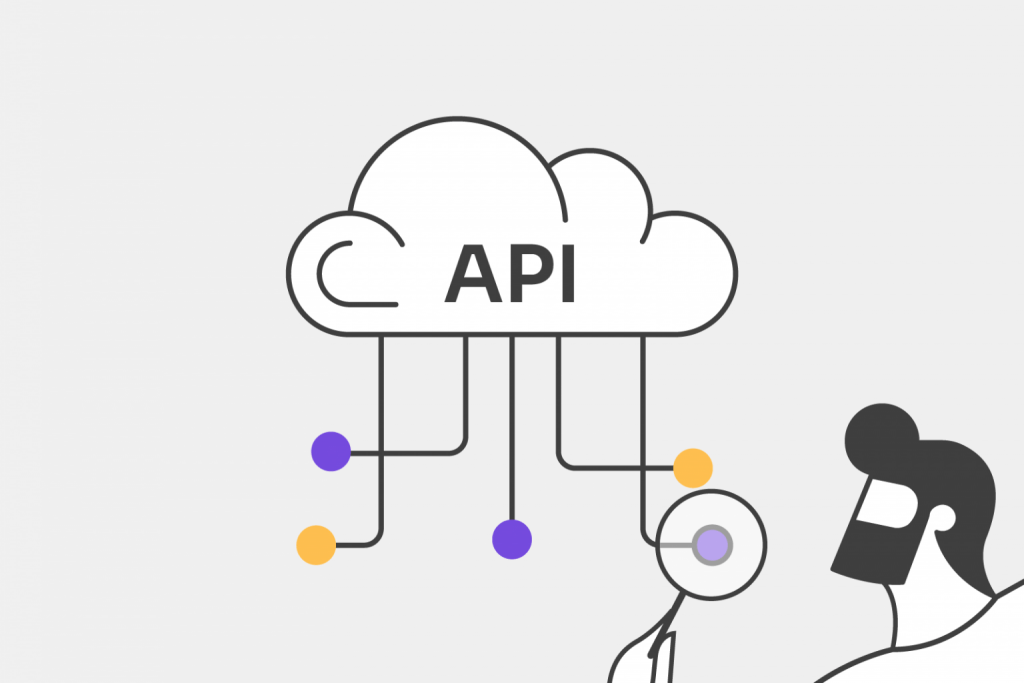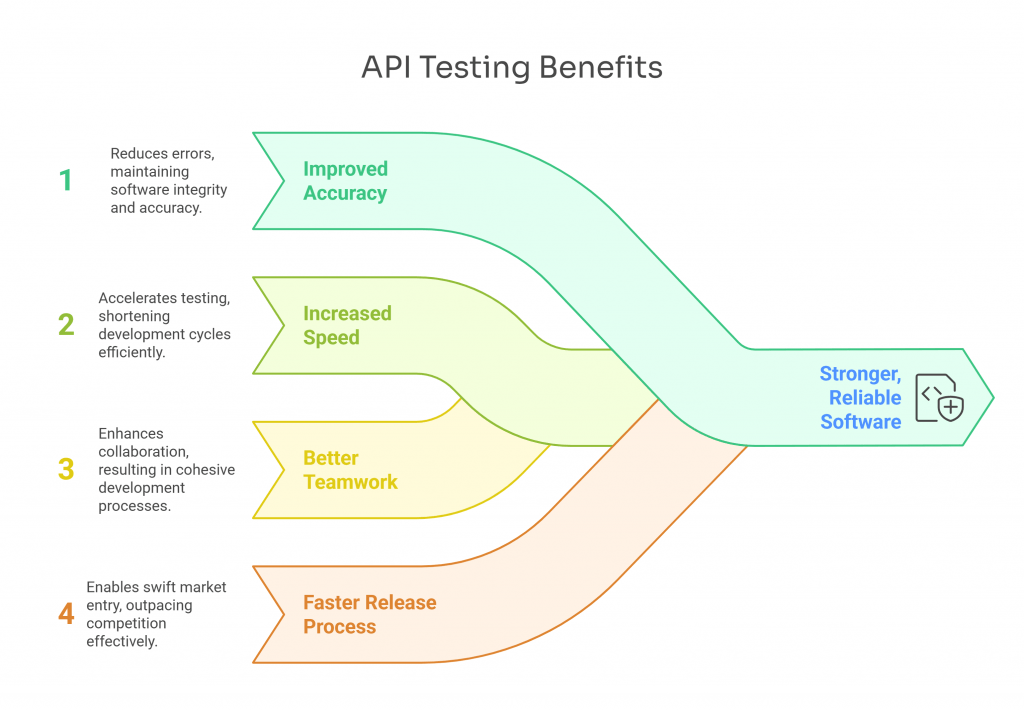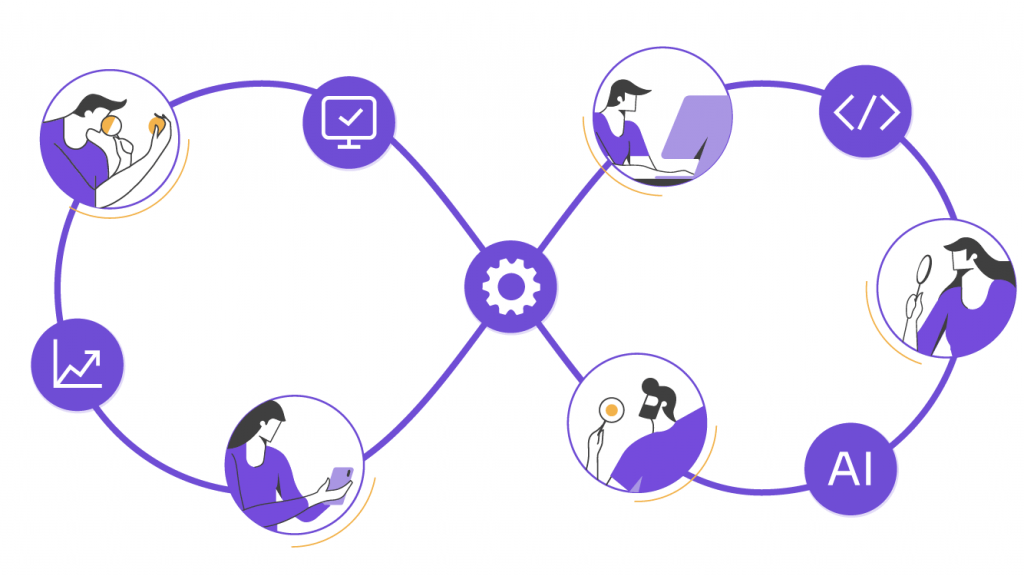Discover the top 15 API testing tools of 2025—compare features, pricing, and real-world use cases in our updated guide.


Your app is only as strong as the APIs it depends on. In 2025, with tighter release cycles and more complex systems, one untested endpoint can break everything.
APIs connect everything, from microservices and third-party integrations to mobile apps and backend systems. When one fails, the impact can cascade fast. That’s why API testing matters. It gives teams the visibility and control they need to prevent outages, reduce bugs, and ship with confidence.
In this guide, we compare 15 top API testing tools for 2025, looking at features, pricing, and use cases.
By partnering with us, you gain access to the best tools and experts in API testing.
Contact us to enhance your software quality!
What’s New in 2025
The API testing ecosystem in 2025 is evolving fast, with innovations in AI, real-time monitoring, and security. In this update of our article, we’ve summarized these trends in a new section: What’s New in API Testing for 2025, and, yes, we’ve refreshed pricing tiers, expanded our “Comparison at a Glance” table, and enriched our FAQs to answer your top questions instantly.
Why API Testing Deserves a Strategic Focus


For companies building complex digital products, API testing is the linchpin of fast, secure, scalable software delivery.
At Abstracta, we work with leading organizations to transform their testing culture, going beyond validation to turn APIs into strategic assets. This article compares today’s top tools, but also reflects our experience helping teams choose the right ones based on their goals, context, and maturity.
Ready to rethink how your team approaches API testing? You’re in the right place.
Overview Of The 15 Best API Testing Tools
Let’s explore our pick of the top API testing tools, keeping in mind ease of use, scalability, integrations, customization, and solid support.
Comparison at a Glance
| Tool | Key Use Cases | Protocols | Ease of Use | Pricing |
|---|---|---|---|---|
| Postman | Collaboration; regression automation (Newman); mocking | REST, SOAP, gRPC | Intuitive GUI with drag-&-drop flows | Free; Basic $14/user·mo (annual) or $19/user·mo (monthly); Pro $29/user·mo (annual) or $39/user·mo (monthly); Enterprise $49/user·mo (annual). Prices may vary; see Postman Pricing. |
| SoapUI | Functional & security testing; load testing; virtualization | REST, SOAP, GraphQL | GUI with optional Groovy scripting | API Test $1 085/license·yr; Performance $8 209/license·yr; Virtualization $1 575/license·yr. Prices may vary; see ReadyAPI Pricing |
| Testsigma | AI-driven codeless tests; web & mobile | REST, SOAP, gRPC | Low-code, drag-&-drop test flows | Contact Sales; see Testsigma Pricing |
| Katalon Studio | IDE-based scripting; BDD/Gherkin; CI/CD parallel runs | REST, SOAP | IDE with auto-completion and dual script/manual view | Free (Studio Free); Create $84/user·mo (annual); Expand $168/user·mo (annual); Scale via Sales. Prices may vary; see Katalon Pricing |
| mabl | Low-code API & UI tests; self-healing; data-driven | REST, SOAP | Low-code web UI with gentle learning curve | Starter (500 credits/mo); Enterprise via Sales. Prices may vary; see mabl Pricing. |
| Sauce Labs API Testing | Cross-browser API integration; contract/mocking | REST, SOAP | Web dashboard plus CLI integrations | Live $39/mo; Virtual Cloud $149/mo; Real Device Cloud $199/mo. Prices may vary; see Sauce Labs Pricing |
| Apigee | Full lifecycle API management; analytics & security | REST, GraphQL | Full-featured web portal; moderate learning curve | Pay-as-you-go varies by traffic; Subscription & Enterprise via Sales. See Apigee Pricing : |
| Karate DSL | BDD-style API tests; mocks; performance via Gatling | REST, SOAP, GraphQL | Gherkin-style scripts—no Java required | Free, open source; see Karate DSL on GitHub |
| GoRest | Learning sandbox; quick sanity tests | REST | Very basic web UI—great for beginners | Free, open source; see GoRest on GitHub |
| Rest Assured | Java-native API validation in CI | REST, JSON, XML | Java DSL—requires Java knowledge | Free, open source; see Rest Assured |
| k6 | Scriptable performance tests; DevOps pipelines | HTTP, WebSocket | JavaScript scripting via CLI | Free, open source; Grafana Cloud Free tier; Pro from $19/mo; Advanced from $299/mo; Enterprise via Sales. See Grafana Cloud Pricing : |
| JMeter | Load & performance testing; multi-protocol | HTTP, SOAP, JDBC… | Java-Swing GUI—powerful but steeper curve | Free, open source; see Apache JMeter |
| BlazeMeter | Scalable load tests; CI/CD; real-world scenario replay | REST, SOAP, JMeter | Web UI plus JMeter-compatible CLI | Basic $149/mo ($99/mo annual); Pro $649/mo ($499/mo annual); Enterprise via Sales. Prices may vary; see BlazeMeter Pricing |
| Paw | API development & testing on Mac | REST, GraphQL | Native Mac UI with rich scripting support | Contact Sales; see Paw Pricing |
| Insomnia | Environment management; plugin extensibility; chaining | REST, GraphQL | GUI focused on environments & variables | Hobby $0/user·mo; Pro $12/user·mo; Enterprise $45/user·mo (annual); Add-ons: $10/25 000 mock reqs. Prices may vary; see Insomnia Pricing: |
Now that you’ve seen how these tools stack up, let’s dive into each one and highlight only the key benefits you need to know.
1. Postman
Launched in 2012, Postman revolutionizes API testing by providing an intuitive platform for creating, sharing, testing, and documenting APIs. It’s designed to simplify web services testing, making it a staple in modern API development with features that enhance collaboration, streamline automation, and offer seamless integration with CI/CD pipelines.
Benefits:
- User-Friendly Interface: The intuitive UI of Postman simplifies the API testing process, making it accessible for users of all skill levels. Its free version is ideal for individuals or small teams starting out with API testing.
- Enhanced Collaboration: Encourages team collaboration in API development through shared workspaces and collections, promoting a more cohesive workflow.
- Robust Automation: Supports comprehensive automated testing with features for running collections and inspecting results, streamlining the testing process.
- Seamless Integration: Integrates with CI/CD pipelines, facilitating continuous testing and efficient workflow integration.
- Customizability and Extensibility: Allows users to tailor their experience with options to add integrations, write custom test cases, and create mock servers, making it a versatile tool for a wide range of testing needs.. This enhances the flexibility and scope of API testing.
2. SoapUI
Founded in 2005 by SmartBear Software, SoapUI is an open-source tool acclaimed for its comprehensive support in automated functional, regression, compliance, and load testing of both REST and SOAP APIs, fostering a collaborative and flexible testing environment
Benefits:
- Functional testing: It offers comprehensive support for testing all aspects of REST and SOAP APIs.
- Load testing: With SoapUI Pro, you can quickly create and run load tests.
- Security testing: It allows you to perform detailed security tests. It verifies if your APIs are safe from common vulnerabilities.
- Scripting: It offers powerful data-driven testing. It allows you to run tests with varying input data.
- Open Source: The community can freely access SoapUI. This drives enhancements and solves problems together.
Don’t miss this article! API Testing with SoapUI and Postman
3. Testsigma
Testsigma is where AI meets API, web, and mobile application testing. It’s designed to make the testing process smoother and more intuitive, bridging gaps between development and quality assurance.
Benefits:
- AI-Driven Efficiency: Accelerates the API testing process through intelligent automation.
- Real-Time API Validation: Provides immediate feedback on API performance.
- Data-Driven Testing: Enhances test coverage by using varied test data sets.
- CI/CD Pipeline Integration: Supports continuous testing in development pipelines.
- Chained API Testing: Offers comprehensive coverage through interconnected API tests.
- Codeless Test Creation: Codeless Test Creation: Enables easy test creation without requiring programming skills, making it accessible for other roles beyond test engineers across different teams.
- Support for Multiple API Methods: Accommodates various API request types.
4. Katalon Studio
Katalon Studio integrates AI to enhance both the functional and aesthetic aspects of APIs. It’s recognized for its ability to bring efficiency and beauty to API user interfaces.
Benefits:
- IDE for API Automation: It streamlines API testing with an IDE that boosts efficiency in scripting, debugging, and maintenance through advanced features like autocompletion, code inspection, and a dual interface.
- API-Centric Testing Solution: It provides comprehensive support for REST, SOAP/1.1, SOAP/1.2 requests, and easy test import from Swagger, Postman, and WSDL.
- Compatibility with Modern Frameworks: It leverages data-driven testing with support for multiple data sources and databases, along with compatibility with BDD and native Gherkin editor, aligning with modern testing frameworks.
- Sustainable and Scalable Testing Platform: It enhances CI and DevOps practices with an IDE offering built-in integrations, easy deployment through Docker, and scalable testing with local and remote execution capabilities.
- Minimal Maintenance Effort: It reduces maintenance work and improves efficiency with the ability to reuse test artifacts across projects and manage complex test scenarios effectively through comprehensive test suite management.
5. mabl
Think of mabl as the approachable expert in AI-driven, low-code integrated API testing. Since 2017, it has been making end-to-end testing a breeze, especially for web applications. It’s like having a helpful guide by your side, simplifying complex testing tasks.
Benefits
- Postman Compatible: It allows to quickly import Postman Collections and utilize unlimited parallel test runs for efficient test orchestration.
- Low-code API Testing: It simplifies API testing for users of any skill level with a low-code solution that supports data-driven testing and variable management.
- Unified Platform: It enables comprehensive end-to-end (E2E) test coverage by merging UI and API tests, with centralized reporting for a complete overview of functional test coverage.
Would you like to know about mabl? We invite you to read this article: Mabl Review: First Steps With The Low-Code Test Automation Solution
6. Sauce Labs API Testing
Sauce Labs provides a comprehensive tool that helps teams streamline API performance from start to finish. It enables users to create and execute tests, generate load tests, virtualize APIs, and monitor live APIs.
Benefits:
- Functional API Testing and Monitoring: Elevate the efficiency and scalability of functional, business logic, and data-driven API testing with automation features. This includes an onboard test scheduler, integrations with CI/CD platforms and event management tools like PagerDuty, and validation against the expected API schema to detect inconsistencies early.
- Integration Testing: Quickly create and execute fast and accurate API integration tests with Sauce Labs, which allows for effective collaboration and reusability of tests, variables, and environments for comprehensive end-to-end validations.
- Contract Testing with Mocking: Sauce Labs streamlines API development by allowing the importation of OpenAPI specification files to generate contract tests. The goal is to enable compliance and the ability to extend tests with functional elements.
- Load Testing & API Benchmarking: Improve API performance insights during development by reusing functional tests as load tests. Simulate realistic traffic patterns, compare benchmarks across environments, and identify performance bottlenecks early in the lifecycle.
7. Apigee
Now part of Google Cloud, Apigee is a full lifecycle API management platform. It enables API providers to design, secure, deploy, monitor, and scale APIs. Founded in 2004 and acquired by Google in 2016, it provides a platform for developing and managing APIs. It has a range of capabilities, which include API design, API analytics, developer portal, and API security.
Benefits:
- Simplified API Development: Apigee offers tools and services to streamline API creation, testing, and debugging.
- Enhanced API Security: It provides advanced security features for APIs, including authentication, authorization, and encryption, to protect data and foster secure testing.
- Scalable API Management: Apigee allows for efficient management of APIs at scale, with features like API versioning and rate limiting that are crucial for high traffic conditions.
- Real-Time Monitoring and Analytics: The platform enables real-time tracking of API performance, which is essential for effective testing and optimization.
- Debugging and Diagnostic Tools: Apigee’s UI and API tools offer in-depth diagnostic capabilities to trace and debug API requests, aiding in the testing process.
- API Lifecycle Management: Apigee supports the full lifecycle of APIs, from development to deployment, testing, and retirement, making it a comprehensive tool for API testing.
- Developer Portal Accessibility: The platform includes a developer portal that aids in discovering and understanding APIs, which is beneficial for API testing phases.
- Hybrid and Multi-Cloud Deployment: It supports deployment across various environments, including private and public clouds, SaaS, and on-premises, providing flexibility in API testing.
- Integration with Google Cloud: Apigee integrates seamlessly with Google Cloud Services, offering enhanced capabilities for building, deploying, and scaling APIs within the Google ecosystem.
- API Proxy-Based Architecture: Apigee enables testing and management through an API proxy-based model, which decouples backend services from the API consumer and adds a layer of security, monitoring, and control.
8. Karate DSL
It is an open-source tool for API testing that combines API test automation, mocks, performance testing, and even UI automation into a single, unified framework. Released by Intuit in 2017, its main purpose is to simplify the process of creating complex API tests, performance tests, and creating mock services.
Benefits:
- Simplicity: Karate DSL requires no Java knowledge. This makes it easy for non-programmers to create and manage tests.
- Flexibility: It allows testers to reuse payload data and user-defined functions across tests.
- Performance Testing: Karate DSL integrates with Gatling for performance testing. This allows you to reuse your functional tests as performance tests.
- Mocking: It provides a built-in capability to set up mock services. This can be used to test edge cases and error conditions. Additionally, it supports behavior-driven development, which helps define tests clearly and understandably for all stakeholders.
9. GoRest
Introduced in 2018, GoRest serves as an efficient platform for those eager to explore and test RESTful APIs. It’s a tool that balances learning and professional API testing.
Benefits:
- Learning Tool: GoRest is an excellent tool for those learning about a restful API service and how to consume it.
- Testing: It provides a variety of endpoints for users to test different types of requests, including GET, POST, PUT, PATCH, and DELETE.
- Data Variety: GoRest provides a variety of data types for users to work with, including users, posts, comments, and more.
- Free to Use: GoRest is free to use, making it accessible for anyone wanting to learn or test RESTful APIs.
10. Rest Assured
Rest Assured is an open-source Java library that simplifies the testing and validation of REST APIs by providing a domain-specific language (DSL) for writing tests. Released by Jayway in 2010 (now a part of Tricentis), it is used for testing and validating REST services in Java.
Benefits:
- Simplicity: Rest Assured provides a simple, user-friendly interface for sending HTTP requests and verifying HTTP responses.
- Integration: It integrates seamlessly with existing Java-based testing ecosystems, making it an excellent choice for Java application testing scenarios. These include JUnit and TestNG.
- Flexibility: It supports XML and JSON request/response payloads. Teams can use it to test REST services implemented in any language.
- Authentication: It supports various methods of authentication. These include Basic, Digest, Form, and OAuth.
11. k6
k6 is a cutting-edge, open-source performance testing tool. It is used to test the scalability, reliability, and performance of software systems, most commonly web services. Unlike GUI-based testing tools, K6 emphasizes scriptability, automation, and integrations into development workflows.
Benefits:
- Open Source: The community can freely access K6. This drives enhancements and solves problems together.
- Scriptable: Developers write API tests in JavaScript, and can simulate interactions using CSV files to generate dynamic datasets. This provides flexibility and the option to incorporate modules and external libraries.
- Modern Architecture: K6 suits modern cloud-native architectures. It easily integrates with DevOps workflows.
- CLI-Based: K6’s command-line nature enhances its automation potential. This makes it a prime choice for continuous integration pipelines.
- Extensible: Users can expand K6 and connect it with other platforms. These include Grafana and InfluxDB. This allows them to delve deeper into visualization and analysis.
12. JMeter
Apache JMeter is an open-source software designed to load test functional behavior and measure performance. It was originally designed for testing Web Applications but has since expanded to other test functions.
Find out How to Automate API Testing Using JMeter?
Benefits:
- Multi-protocol Support: JMeter supports testing for several protocols. These include HTTP, SOAP, JDBC, LDAP, and JMS.
- Platform-independent: Being a Java desktop application, it can run on any system that supports Java.
- Multi-threading Framework: This allows concurrent and simultaneous sampling of different functions by many separate threads. It also allows simultaneous sampling of the same function by separate thread groups.
- Visualization: It provides a variety of graphical analyses of performance reports.
While powerful and flexible, JMeter may present a steep learning curve for beginners due to its interface and extensive configuration options.
Check out this article! JMeter DSL, an Innovative Tool for Performance Testing.
13. BlazeMeter
BlazeMeter excels in API testing and monitoring, enabling teams to validate APIs across development and production with advanced assertions, real-time alerts, and support for shift-left and shift-right strategies. Its JavaScript engine supports custom validations and dynamic workflows. BlazeMeter is also widely known for its robust performance and load testing capabilities
Benefits:
- API Testing & Monitoring: Validates APIs across environments with real-time alerts, custom assertions, and dynamic workflows.
- Scalable Performance Testing: Offers robust capabilities for testing APIs under heavy load, including support for open API specifications to streamline test configuration.
- Realistic User Scenarios: Simulates real-world user scenarios for more accurate testing results.
- CI/CD Integration: Seamlessly integrates with continuous integration and delivery pipelines, enhancing development workflows.
- Comprehensive Reporting: Provides detailed performance insights, helping teams make informed decisions.
- Flexibility and Ease of Use: Offers a user-friendly interface and flexible configuration options, catering to both novice and experienced testers.
14. Paw
Paw, designed specifically for Mac users, is a comprehensive tool for API development and testing. It’s renowned for its robust environment that caters to building, exploring, and automating API tests.
Benefits
- Intuitive Design Interface: Streamlines the process of API request construction and response analysis.
- Automation Capabilities: Facilitates the automation of API tests, enabling developers to efficiently validate API responses and behavior.
- Dynamic Values: Offers dynamic values and test scripts for a more flexible and powerful testing experience.
- Comprehensive Documentation: Generates detailed API documentation, aiding in collaboration and knowledge sharing.
- Extensive Integration: Supports integration with various tools and services, enhancing its utility beyond just API testing.
15. Insomnia
Primarily known as a manual API testing client, Insomnia also offers features that extend into the realm of API automation. Insomnia supports configuring and creating query parameters for dynamic and complex requests. Its ability to run tests and validate responses makes it a valuable tool for developers seeking a versatile API client.
Benefits
- Easy-to-Use Interface: Simplifies the creation and execution of API requests.
- Test Running and Validation: Enables automated test runs and response validations, important for consistent API testing.
- Environment Management: Manages different environments and variables, streamlining the testing process across various conditions.
- Plugin Support: Offers extensibility through plugins, enhancing its functionality.
- Rich Response Viewing: Provides detailed views of API responses, aiding in thorough analysis and debugging.
We invite you to keep learning about Insomnia in this review.
Need help with Test Automation?
Take a closer look at our case studies and contact us!
Trends Shaping API Testing in 2025


The API testing landscape is evolving with innovations that are reshaping how teams approach software quality. Here are the key developments shaping the field this year:
- AI-Powered Testing Tools
Artificial intelligence is driving smarter test automation. Tools like Abstracta Copilot let teams interact with APIs using natural language, bridging skill gaps and speeding up workflows. Predictive analytics are also helping identify issues earlier and simplify debugging. - Real-Time Monitoring and Feedback
Continuous monitoring is becoming central to API testing strategies. Platforms like Grafana and Datadog provide real-time insights into performance and reliability, enabling proactive optimization. - Cross-Cloud API Testing
With the rise of hybrid and multi-cloud architectures, tools like Apigee support consistent API testing across AWS, Azure, and GCP, offering flexibility and scalability. - Shift-Left Testing Practices
Teams are moving API testing earlier in the development lifecycle. Tools such as Testsigma and Katalon Studio integrate seamlessly with CI/CD pipelines, enabling faster feedback loops. - Expanding API Security Testing
Security testing is becoming more robust. Tools like SoapUI and Sauce Labs now support automated vulnerability scans, OWASP compliance, and zero-trust API models. - Unified Tool Ecosystems
Solutions like Sauce Labs API Testing and Apigee offer end-to-end environments that unify testing, monitoring, and lifecycle management in a single platform. - Open-Source GenAI Test Generation
- Emerging open-source projects are pushing the boundaries of API testing with GenAI. One standout is TestCraft’s API Automation Agent, developed by Damian Pereira (Endava). It creates full automation frameworks from OpenAPI or Postman v2 collections using LLMs such as GPT-4o/4.1 or Claude 4 Sonnet, generating assertions, test flows, and type-safe models.
These trends are shaping a smarter, faster, and more secure approach to API testing in 2025—and we’re excited to be part of that journey.
FAQs about API Testing Tools


What Is an API Testing Tool?
An API testing tool is software used to test application programming interfaces (APIs) for functionality, performance, security, and reliability. It helps automate API testing, validate API responses, and enable API endpoints to behave as expected across multiple test environments.
What Is the Best Tool to Test an API?
The best API testing tools vary based on your needs. Postman is known for its intuitive interface; SoapUI is strong in comprehensive testing; JMeter is ideal for performance and load testing; and Abstracta Copilot uses AI to enable seamless automated testing and scale test coverage across complex test scenarios.
Is Postman an API Tool?
Yes. Postman is a widely used API testing tool for RESTful APIs. It lets you send HTTP requests, manage environment variables and query parameters, automate tests, and generate test scripts. It’s also used for API development, API documentation, and integration with CI/CD pipelines.
How to QA Test an API?
To QA test an API, create test cases that validate API responses, status codes, and error handling. Use tools that support data-driven testing, functional API testing, security testing, and exploratory testing. Automation capabilities help simplify test execution across multiple environments.
Which API Testing Tool Offers the Best Balance of Ease and Advanced Features?
Testsigma and Katalon Studio combine user-friendly interfaces with powerful automation capabilities. They support test automation, complex test scenarios, data-driven testing, and integration with CI/CD pipelines, making them ideal for teams at different maturity levels.
Why So Many Teams Choose SoapUI for Comprehensive API Testing?
SoapUI supports both REST and SOAP APIs, offers enhanced security testing, and excels in functional and performance testing. Its graphical user interface and support for seamless automated testing make it a go-to choice for teams seeking full lifecycle API management.
How Can Postman Streamline My Entire API Development and Testing Process?
Postman supports creating API requests, managing test environments, validating API responses, and generating test scripts. It simplifies testing REST APIs and enables automated test execution, all through an intuitive interface that suits both developers and test engineers.
Are There Open-Source Tools That Support Both REST and GraphQL APIs Effectively?
Yes. Open source API testing tools like SoapUI, k6, and Karate DSL support RESTful APIs, GraphQL, and SOAP APIs. These tools work across static and dynamic resources, allow thorough testing, and offer flexibility for Java developers and other programming environments.
What Are the Main Types of Testing in APIs?
The three most common types are functional testing, performance testing, and security testing. Additional types include load testing, exploratory testing, and interoperability testing, all of which contribute to better test coverage and more reliable software development.
Do API Testing Tools Support Different Programming Languages and Frameworks?
Yes. Many tools support Java developers and other programming languages. You can write tests using graphical user interfaces or command line tools, interact with REST services, and validate both REST API and SOAP API behavior in complex test environments.
How Do I Start Testing APIs and What Tools Are Available?
To start testing APIs, use intuitive tools like Postman or Insomnia to send HTTP requests and validate API responses. As you scale, tools like JMeter, BlazeMeter, and Testsigma help automate tests, manage lifecycle API management, and support load and performance testing.
What Is REST API Testing?
REST API testing involves sending HTTP requests to RESTful APIs and validating responses, status codes, headers, and payloads. It helps ensure endpoints function as expected, handle data correctly, and respond reliably under different conditions.
What Is the RESTful API Modeling Language (RAML)?
The RESTful API Modeling Language is a structured way to describe REST APIs. RAML helps teams define endpoints, methods, and expected data formats, making it easier to automate tests, document services, and maintain consistency in REST API testing projects.
How Do API Testing Tools Handle API Traffic and SOAP APIs?
API testing tools can simulate API traffic to evaluate how systems behave under different loads, helping teams detect bottlenecks and performance issues. When testing SOAP APIs, these tools send structured XML requests based on the Simple Object Access Protocol, validate responses, and check for strict adherence to schemas and service contracts.
How We Can Help You


With over 16 years of experience and a global presence, Abstracta is a leading technology solutions company with offices in the United States, Chile, Colombia, and Uruguay. We specialize in software development, AI-driven innovations & copilots, and end-to-end software testing services.
Our expertise in API tests spans across industries. We believe that actively bonding ties propels us further and helps us enhance our clients’ software. That’s why we’ve built robust partnerships with industry leaders Microsoft, Datadog, Tricentis, Perforce BlazeMeter, and Saucelabs.
Our holistic approach enables us to support you across the entire software development lifecycle.
Our Clutch reviews speak for themselves. Contact us to enhance your software quality!


Follow us on Linkedin & X to be part of our community!
Recommended for You
JMeter API Testing: How to Automate API Performance Tests
Testing Generative AI Applications
Tags In


Sofía Palamarchuk, Co-CEO at Abstracta
Related Posts
Selenium vs Watir
Choosing between these two test automation tools for an automation framework I recently got started on a client project in which I’m putting together an automation framework, where, luckily, I’ve been given some objectives that are quite clear to fulfill. I want to discuss one…
Quality Sense Podcast: Alan Richardson “The Evil Tester” – On Test Automation
Thinking critically about test automation from a developer’s perspective In these two Quality Sense episodes, Federico delves into an entertaining and eye-opening discussion with Alan Richardson, a British consultant also known as “Evil Tester.” With more than 25 years of experience in testing and development,…
Search
Contents








